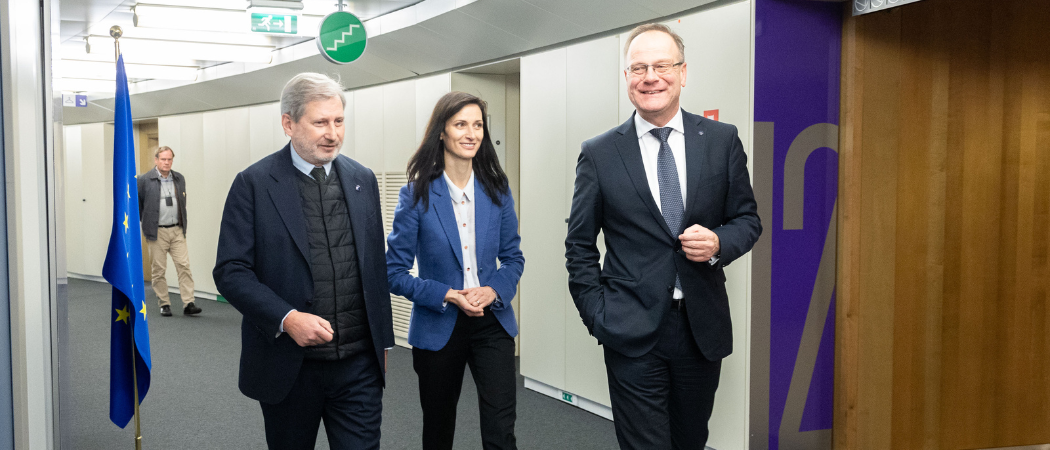Hungarian minister Tibor Navracsics says the government is open to changing the structure of public trust foundations to appease EU rule of law concerns

Left to right: EU budget commissioner Johannes Hahn, research commissioner Mariya Gabriel and Hungary’s minister of regional development Tibor Navracsics in Brussels. Photo: Jennifer Jacquemart / European Union 2023
The Hungarian government has signalled its willingness to make changes to the structure of the public trust foundations it set up recently to oversee 34 universities and cultural institutions, in line with EU demands linked to rule of law concerns.
This follows a meeting on Wednesday between Tibor Navracsics, Hungary’s minister of regional development, and the EU budget commissioner Johannes Hahn and research commissioner Mariya Gabriel, for what Navracsics’s office described as "compromise-seeking" talks. Hahn also met the Hungarian minister of justice, Judit Varga, on Tuesday.
The hastily organised discussions follow the EU Council’s December decision to freeze access to Erasmus+ and Horizon Europe funds for Hungarian institutions controlled by public trust foundations. Twenty-one of the country’s universities are managed by these foundations.
After the talks yesterday, Navracsics expressed openness to changing the rules which mean that politicians, including serving government ministers, can sit on the boards of these foundations, and to introducing a fixed term on how long any board member can serve, which is currently without limit.
These modifications are, “Not an obstacle for the Hungarian government to change,” Navracsics said. “The Erasmus+ and Horizon Europe programmes will continue to run smoothly, the underlying concerns can be addressed, and we are talking about two not too complicated legislative amendments which are expected to be adopted by the Hungarian Parliament in March.”
Navracsics added that he is seeking further clarification from the Commission about the precise nature of these changes. This could be related to the rank of politician the EU wants to be removed from the boards of trustees, an issue that will almost certainly affect Navracsics and Varga, who both sit on the boards of foundations controlling Hungarian universities.
Limiting political involvement
Thomas Estermann of the European University Association said the talks show there is a willingness from the Hungarian government to find a solution, but there are questions remaining about the precise nature of the Hungarian government’s actions.
“It is important to have more details about this because clearly if they say they are willing to limit the involvement of politicians, we still don’t know who that would involve and how that transition would be organised,” said Estermann.
“As for limiting the term time of members of the boards of trustees, it will make a difference if the rules are changed to be in line with comparable European standards of maybe between five or six years, or if it is still significantly longer. There are still a lot of questions, so it is best to wait and see what happens.”
András Kádár, co-chair of the human rights organisation the Hungarian Helsinki Committee, also said it would be a step in the right direction if high-ranking politicians were removed from the boards, but said this was not the only problem.
“When the trusts were created, public assets of enormous value were handed over to them, while the possibility of meaningful public overview of how the funds are actually used were removed through legislation. Therefore, to protect the EU budget and domestic resources, effective public scrutiny over the trusts and the transferred assets should also be ensured,” he said.
He added the fact it took hard financial consequences to be set down by the EU for Hungary to act over this issue is another “clear indication of the Hungarian government’s true attitude to the rule of law”.
“The EU institutions must remember this lesson, and make sure that the implementation of the milestones goes beyond just ‘ticking all the boxes’, because if allowed, the Hungarian government may try to do so.”
In the meantime, the 180,000 Hungarian students affected by the freeze can continue to apply for Erasmus, Navracsics said, and researchers at the 21 universities can apply for Horizon Europe funding. This was confirmed in a joint statement made by the commissioners’ cabinets and sent to Science|Business in an email.
However, the statement also stressed the importance of Hungary resolving all of the rule of law issues that sparked the funding freeze, and which were introduced under the EU conditionality regulation, which was triggered against Hungary on 27 April last year.
The EU has set 17 measures for Hungary to take to address rule of law concerns, one of which relates to overhauling the structures of public interest foundations. As part of this, the EU has also frozen 55% of cohesion funds destined for Hungary, amounting to €6.3 billion.
On a separate but related note, the Council also in December approved Hungary’s pandemic recovery fund spending plan, but withheld the €5.8 billion in grants until the government implements 27 so-called ‘super milestones’, which are reforms to address rule of law and judicial independence issues.





 A unique international forum for public research organisations and companies to connect their external engagement with strategic interests around their R&D system.
A unique international forum for public research organisations and companies to connect their external engagement with strategic interests around their R&D system.